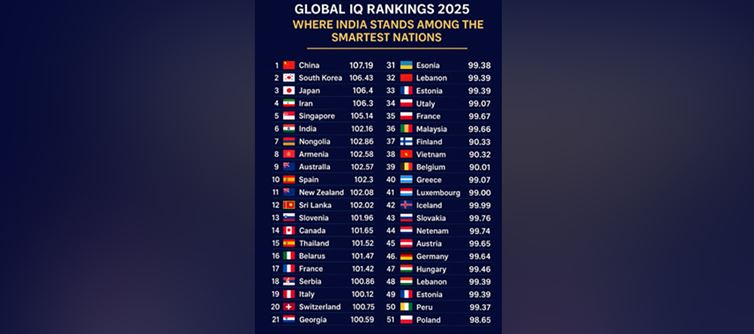
The International IQ Test has released its latest global rankings (as of january 1, 2025), based on data from 1.35 million test-takers worldwide. The study offers fascinating insights into how different nations fare on average intelligence, sparking fresh debates on education systems, cultural factors, and opportunities that shape human potential.
1. east Asia Dominates the Charts
🇨🇳 China (107.19) tops the list, with 🇰🇷 South Korea (106.43) and 🇯🇵 Japan (106.4) close behind.
This reflects the rigorous education systems, discipline, and high academic emphasis in these countries.
2. Surprising Entry: iran in the Top 5
🇮🇷 iran ranks 4th with 106.3, ahead of even Singapore.
Despite economic sanctions and political struggles, Iran’s focus on STEM fields and competitive exams has yielded high intellectual results.
3. Europe’s Strong but Scattered Presence
Nations like 🇷🇺 russia (103.16), 🇪🇸 spain (102.3), 🇸🇮 slovenia (101.96), and 🇫🇷 france (101.42) secure strong positions.
The distribution shows Europe’s balanced education access, though east Asia has overtaken it in sheer numbers.
4. India’s Position: Room to Grow
🇮🇳 india comes in at 44th place with 99.08.
While not among the top 20, India’s rank highlights both the immense talent pool and the challenges of unequal access to quality education, brain drain, and rote-learning systems.
With better reforms, india has the potential to climb higher in the coming years.
5. The West vs. The Rest
Surprisingly, the 🇺🇸 united states (99.74) ranks 30th, lower than Sri Lanka, spain, and even Thailand.
Traditional Western powers like 🇬🇧 UK (99.68) and 🇩🇪 germany (99.64) are mid-table, proving that wealth doesn’t always equal higher IQ averages.
👉 Takeaway: IQ rankings don’t define the worth of a nation, but they do reflect the impact of education systems, cultural discipline, and opportunities. While east Asia continues to shine, countries like india stand at a crossroads—either reform education deeply or risk staying mid-tier.




 click and follow Indiaherald WhatsApp channel
click and follow Indiaherald WhatsApp channel